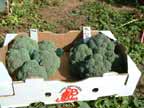Cancer, genes and Broccoli - study of genetic differences in cancer protection
Dec 7, 2005 Â People who gain less protection from cancer by eating broccoli may be able to compensate for the difference in their genetic make-up by eating Âsuper broccoli', a variety with higher levels of the active plant chemical sulforaphane, or by eating larger portions.
Lead scientist on the new research, Professor Richard Mithen of the Institute of Food Research (IFR), said: ÂEating a few portions of broccoli each week may help to reduce the risk of cancer. Some individuals, who lack a gene called GSTM1, appear to get less cancer protection from broccoli than those who have the gene.
"Super" broccoli developed by traditional plant breeding methods

Two varieties of broccoli shows standard broccoli on the left ("Iron"), and "super broccoli" on the right

|
"Our studies suggest that this may be because if you lack the gene you cannot retain any sulforaphane inside your body, it is all excreted within a few hours. However, if you consume larger portions of broccoli, or broccoli with higher levels of sulforaphane, such as the Âsuper broccoli', you may be able to retain as much sulforaphane in your body as those who have the gene. Eating larger portions may have additional benefits since broccoli is also a rich source of other vitamins and minerals."
Broccoli is the main source of natural compound sulforaphane. It belongs to the crucifer family of plants which includes the brassica vegetables cabbage, cauliflower and Brussels sprouts, and the closely related Chinese cabbage and turnips. Other crucifers include watercress and salad rocket (arugala).
The most distinctive characteristic of crucifers is that their tissues contain high levels of glucosinolates. When they are eaten, glucosinolates are broken down to release isothiocyanates. There is a well established body of evidence to show that isothiocyanates are among the most potent dietary anticarcinogens known.
Sulforaphane is the main isothiocyanate derived from broccoli. ÂSuper broccoli' contains 3.4 times more sulforaphane than standard varieties. It has been developed by traditional plant breeding methods.
Fifty per cent of the population lack the GSTM1 gene. While these people may gain less cancer protection from consuming broccoli, it is likely that they gain more cancer protection from eating other types of crucifers, such as cabbages and Chinese cabbage. So the best advice is to eat a mixture of crucifers.
This research was funded by IFR's Core Strategic Grant from the Biotechnology and Biological Sciences Research Council and by the University of Nottingham and Seminis Inc. It is part of ongoing research at IFR to identify the optimal levels of a range of food compounds for human health.
The mission of the Institute of Food Research ( www.ifr.ac.uk ) is to undertake international quality scientific research relevant to food and human health and to work in partnership with others to provide underpinning science for consumers, policy makers, the food industry and academia. It is a company limited by guarantee, with charitable status, grant aided by the Biotechnology and Biological Sciences Research Council ( www.bbsrc.ac.uk ).
Seminis Inc. ( www.seminis.com ) markets vegetable seeds. Its products are designed to increase crop yields, reduce dependence on agricultural chemicals, limit spoilage, offer longer shelf life, and produce vegetables and fruits with better taste and nutritional content. Seminis has established a worldwide presence and global distribution network that spans 150 countries. It is developing commercial varieties of broccoli with enhanced levels of glucosinolates for consumers.
Full reference for the paper:
Glutathione S-transferase M1 polymorphism and metabolism of sulforaphane from standard and high-glucosinolate broccoli.
Am J Clin Nutr; 82: 1283: 2005
Earlier food news
Broccoli
Extracts May Fight Prostate Cancer, Researcher Says (Dec 2003)
Chemical
in Broccoli Compared to Casodex: Blocks Growth of Prostate Cancer
Cells... May 2003
"Plastic" Trans
Fats Wreak Havoc in the Body, Found in Many Popular Foods (Sept
2003)
Update: Food
Manufacturers Oppose Trans Fat Consumer Information on Labels
(Oct 9, 20003)
Strong-flavored onions fight cancer Although milder onions are popular, the bitter and more pungent onions seem to have more flavonoid compounds and appear to be more healthful, according to researchers at Cornell University. October 20, 2004.
Foods Fight Cancer Better Than Vitamin Pills Recent nutrition research published in the medical journal The Lancet confirms what most people already feel in their gut -- the best way to protect yourself from digestive cancers is by eating right, not taking a pill. Oct 7, 2004. Full story » »
Dining out can blind you to what you eat Ignorance is bliss, which may be what lures people tired of a healthy diet to break away and head for fast food. People underestimate the amount of fat and calories in restaurant meals, sometimes by very significant amounts. Sept 27 2004. Full story » »
Recent news
Fruits and Vegetables Prevent Osteoporosis In Men
April 2, 1999.Two different bone conditions may afflict
men who have prostate cancer -- osteoporosis (or bone loss) caused
or made worse by hormonal blockade; and spread of cancer to the
bones. Drugs may be needed to combat osteoporosis, but diet may
play a part in protecting against it. A new look at lifetime diets
of participants in the Framington Heart Study found that for both
men and women, lifelong dietary intake of potassium, magnesium
and fruits and vegetables affected bone strength in old age.
Full
story
Broccoli organic
seed supplies, sprouting methods
Green
Tea ABC newsman
George Orick drinks green tea in Indonesia and talks about tea pickers.

